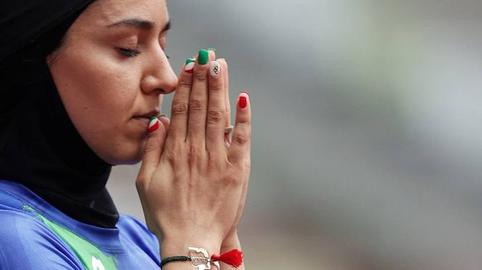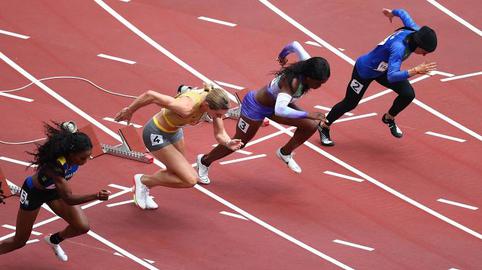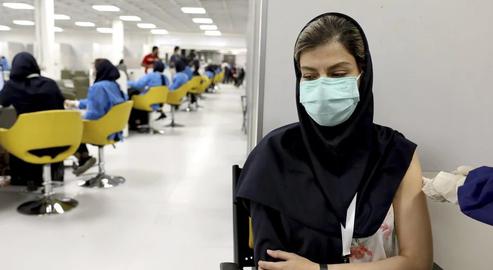Iranian sprinter Farzaneh Fasihi arrived at the Tokyo Olympics without any official support from the Islamic Republic. The Ministry of Sports, the Iranian sporting federation and Iran's National Olympic Committee all turned their backs on her. And yet she made history: she became the first Iranian woman runner to compete in the Olympics for 57 years. She wore the hijab as Iranian law mandates. But unfortunately, because her rivals did not have their heads covered, Islamic Republic of Iran Broadcasting denied the Iranian public from watching her compete.
Simin Safamehr was the first Iranian women to compete in the 100-meter sprint, also in Tokyo, at the 1964 Olympics. Fasihi, 28, qualified for the Olympics as part of the universality quota, which allows countries to send athletes to compete if they haven’t qualified, as long as there are available spaces. She was recently given the nickname “jaguar” and has a strong sporting record. At 28, she was presented with a silver medal as part of Iran’s national team at the 4x400m indoor medley at the 2016 Asian Indoor Championships. She also excelled at the 2018 Asian Indoor Athletics Championships, and was a champion in the Serbian 60m international sprint. While in Serbia, Fasili was quoted as saying that she had spent her dowry on getting to Serbia.
From Gymnastics to Sprinting
Farzaneh Fasili was born in January 1993. She started out in gymnastics, and joined Iran's national youth team. But, then, she says, she discovered sprinting. "There were races at school. I registered quite incidentally and just for fun. But after the first round, I was running very well. When the school competitions ended, I realized I was interested in the sport."
In an interview with Hamshahri newspaper in 2016, Fasili talked about the first time she thought about competing.
She said to her PE teacher: "So, what now? I haven’t ever run."
"You don't have to do anything special," the teacher said with a smile. "I just blow the whistle, and you start to run."
When Fasili crossed the finish line, the teacher said, ”That girl just broke the record for Isfahan province."
In 2011, during her last year of high school, Fasili began her life as a professional runner. At that point and in the years that followed, she realized that athletics would be even harder for her than gymnastics had been. "The weights we used to build the muscles in our legs and arms were nothing like the ones we had for gymnastics. I saw running as a new challenge.”
Fasili became a member of the Iranian national team in 2015. She won one medal after another: a silver medal in the team section of the 4x400m Asian medley at the national championships, a bronze for the 60m Asian championship, and she qualified for the World Athletics Championships.
But she was delivered a blow in 2018, when she was not invited to the qualifier competitions of the Jakarta Asian Games. "I am thinking of saying goodbye to professional sports and athletics,” she posted on Instagram. “Looking at my medals in despair."
Blocked From Competing — But Making History Anyway
Despite the fact that Fasihi had won two medals at Asian competitions and 10 medals at the provincial and national levels, the sports federation has refused to support her bid to qualify for the 2022 Asian Games, as they did for the Olympics.
She has continued to train, supported by her husband, and put herself forward for international competitions without the support of any official sporting bodies.
But when officials from the Iranian athletics federation realized Fasihi had plans to compete abroad, they started to worry, and Iran’s sports ministry followed suit. What if she decided to compete outside Iran not wearing hijab? Debates followed on social media about whether hijab was restrictive and could prevent women athletes from achieving their best. When it came time to compete, however, Fasihi kept her hijab intact.
Iraj Arab, the current head of the Iranian athletics federation, was one of the most prominent critics. As the former CEO and board member of Persepolis Football Club and former head of the General Security Department of the Ministry of Sports, Arab’s opinion was valued within Iran’s sporting community and beyond. He has become known for his defense of the Iranian “ideal” of Iranian sportsmanship defined by an unwavering patriotism and conservatism.
The Iranian Football Federation repeatedly blocked Fasihi from participating in international tournaments. Despite this and the fact that she had spent nearly a year out of training, she qualified for the 18th World Athletics Indoor Championships due to take place in Serbia in 2022, running 60 meters in 7.29 seconds, and setting a record for Iran.
Iran Arab not only objected to her qualification, he appealed to the World Athletics Federation and the Serbian Athletics Federation to annul it.
The Serbian federation asked for more information to justify the request, prompting the Iranian Athletics Federation to partially concede. In an interview with the Iranian Students’ News Agency on February 11, 2021, Arab admitted the federation's letter to the Serbian federation was "childish."
On Friday, July 30, Fasihi ran the 100 meters in 11.76 seconds at the pre-qualifying stage at the Tokyo Olympics. She advanced to the preliminary stage with seven other runners, but failed to progress further. But she has made history nonetheless — for being the first female runner to reach the Olympics in 57 years, but also for doing it without any support from Iran’s official sports bodies.
Related Coverage:
Kimia Alizadeh: Meet Iran's 'Daughter-in-Exile' Who Shone at the Olympics
Revolutionary Guard Wins Iran's First Olympic Gold
"A Message of Hope": Five Iranians on the Olympic Refugee Team
IranWire Exclusive: Athletes Forced to Offer Homes as Guarantees Against Defection
visit the accountability section
In this section of Iran Wire, you can contact the officials and launch your campaign for various problems




























comments